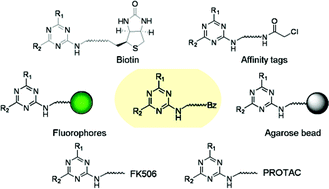Forward chemical genetics has been highlighted as a new method for the study of various biological pathways using exogenous ligands. However, limited success in the field has demonstrated that, in many cases, it is not feasible to determine the protein targets of small-molecule probes. Identifying protein targets is an integral part of forward chemical genetics and is also the most challenging. Over the past decade, several biochemical and genetic methods have been developed to facilitate target identification processes. Even so, one of the major difficulties is that these methods require the chemical modification of active compounds, with a significant amount of structure–activity relationship (SAR) study to ensure that the small-molecule tags do not compromise bioactivity. In this article, we will highlight a new strategy for small molecule libraries that have built-in linkers in order to avoid this well-known problem and demonstrate their successful use in forward chemical genetics.
You have access to this article
 Please wait while we load your content...
Something went wrong. Try again?
Please wait while we load your content...
Something went wrong. Try again?


 Please wait while we load your content...
Please wait while we load your content...